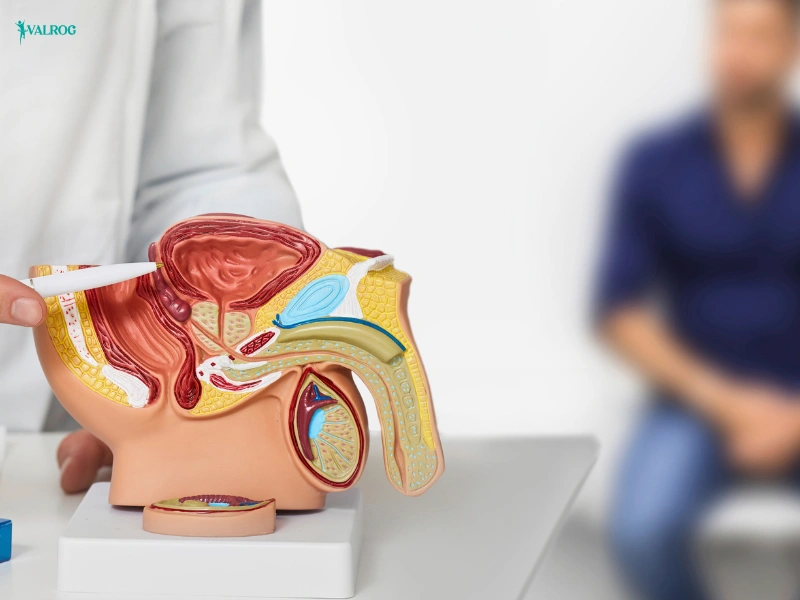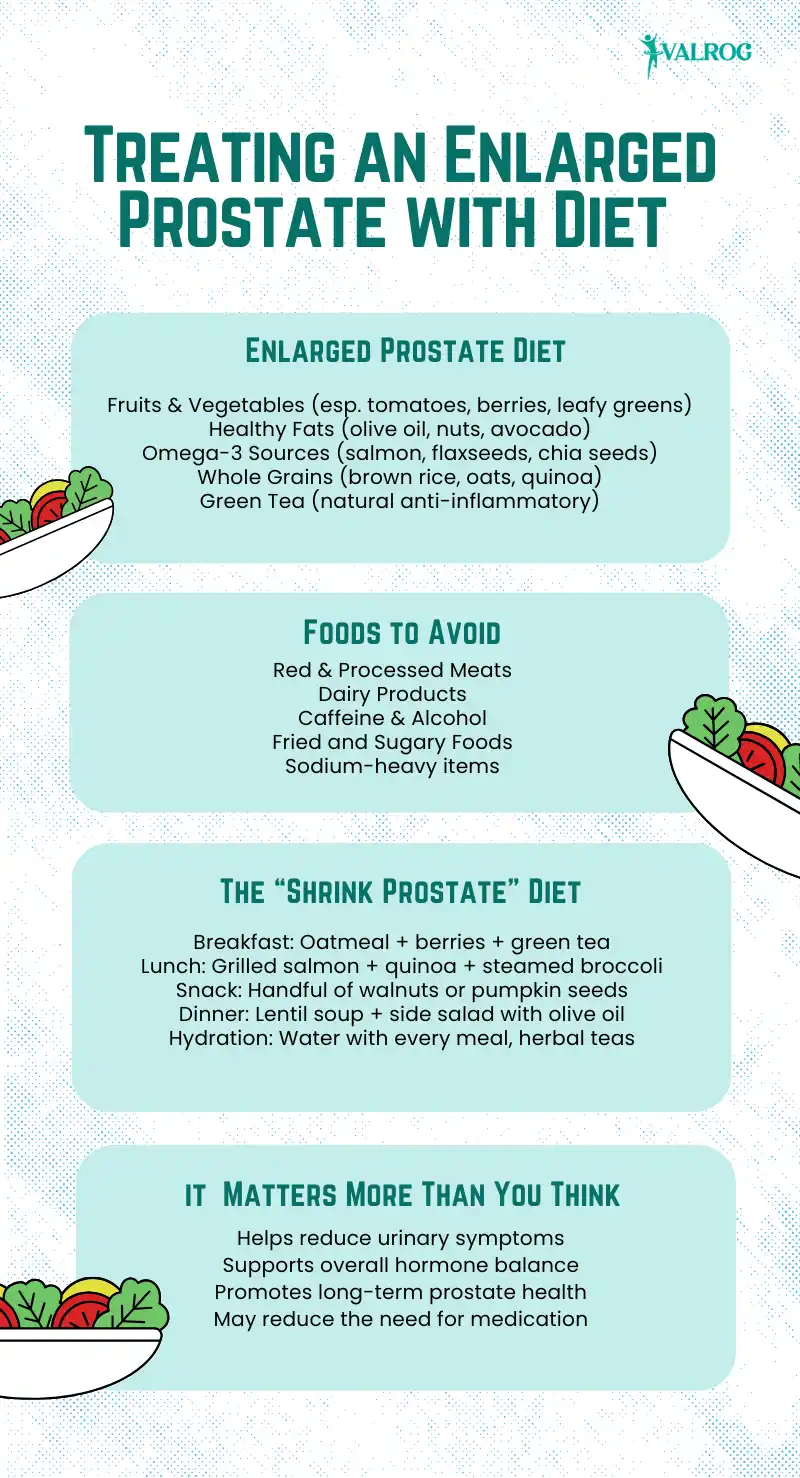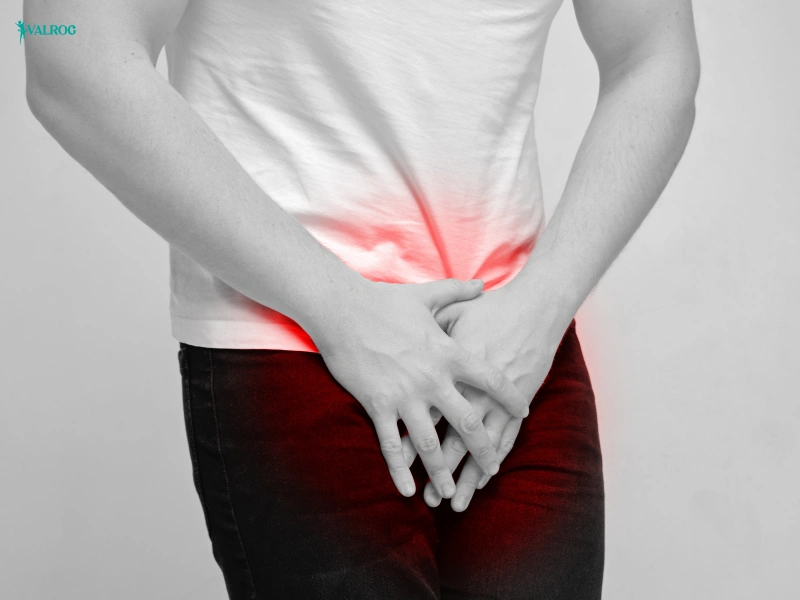Are you a man aged over 50? Then you either have it or know someone who does: an enlarged prostate, or benign prostatic hyperplasia (BPH). Though it is not cancer, it can significantly affect the quality of your life, making you urinate frequently, experience a weak stream of urine, and even disrupt sleep.
Now the good news: there is growing evidence that diet can significantly help in managing BPH. What you eat may not only reduce your symptoms—it might even help shrink your prostate over time. Sounds too good to be true? Stick with me. In this enlarged prostate diet guide. We’re going to break down exactly which foods are good for prostate health and which ones to avoid.
Why Diet Is a Big Deal for Prostate Health
Let’s get one thing straight: food isn’t a replacement for medication if your doctor recommends it. But it can complement treatment, support your body naturally, and in some cases, slow or even reverse the growth of the prostate gland.
A study by Kristal et al. found that men who had higher intakes of vitamin D, zinc, and lycopene were less likely to develop BPH or experience worsening symptoms. Interestingly, vitamin D was shown to inhibit certain inflammatory pathways (including RhoA/ROCK and COX-2 expression), both of which are involved in prostate tissue growth [Kristal et al., Citation3].
In fact, a double-blind randomized controlled trial found that men with an enlarged prostate who took 6000 IU of a vitamin D analogue daily for 10 months experienced a 2.9% decrease in prostate volume—a statistically significant result (p < 0.0001) [Citation4].

So yes—diet can make a difference.
Visit: Voluntary Psychiatric Hold – What It Is, How It Works & Your Rights
What Exactly Is BPH (and Why Does It Happen)?
BPH is an abbreviation that means benign prostatic hyperplasia or the non-cancerous enlargement of the prostate gland, which tends to enlarge over time in men, and this incidence increases with age. But why is that important?
Since the enlargement of the prostate can constrict the urethra. When this occurs, one may find it harder to initiate urination, empty the bladder completely or even sleep throughout the night without getting up to visit the bathroom a number of times. In the long run, such symptoms may exhaust the quality of life.
Although hormonal changes play a large role, it is now understood that inflammation, diet, and lifestyle play key roles that determine the rate of prostate enlargement and the severity of symptoms.
The Best Enlarged Prostate Diet
Let’s break it down: which foods for an enlarged prostate to include in your daily meals to keep your prostate in check?
Discover: Erik Erikson’s Theory Explains 8 Key Stages of Human Growth
Tomatoes (High in Lycopene)
Tomatoes contain a powerful antioxidant, lycopene, which has been suggested to slow down the enlargement of the prostate and prevent prostate cancer. Cooked tomatoes (such as tomato sauce or paste) are even better since cooking raises the bioavailability of lycopene.
Fun Fact: Lycopene has the potential to reduce PSA levels as well as inflammation markers related to prostate enlargement [Citation2730].
Cruciferous Vegetables
Think broccoli, cauliflower, kale and Brussels sprouts. They are also sources of sulforaphane, a plant chemical that has anti-inflammatory and anticancer effects.
In one randomized clinical trial study in which 78 men with recurrent prostate cancer participated, the study established that taking sulforaphane supplements daily was able to slow down the PSA doubling time by up to 86 percent [Citation55]. This implies that these vegetables could similarly help males with BPH to decelerate the expansion of cells in the prostate gland.
Fatty Fish (Salmon, Sardines, Mackerel)
Fish is rich in omega-3 fatty acids which are known as inflammation reducers. Among the silent causes of BPH is chronic inflammation.
In cultures where fish is consumed more and red meat is taken in lesser amounts, prostate issues, such as BPH and prostate cancer, do not seem to be as prevalent [Citation36].

Explore: Feeling Self Doubtful? How to Overcome It with Confidence
Flaxseed
Flaxseed has a component known as secoisolariciresinol diglucoside (SDG) which has the possibility of actually alleviating urinary symptoms and raising the quality of life in men affected by BPH.
A daily dose of 300 600 mg of SDG significantly improved urinary symptoms and improved International Prostate Symptom Scores (IPSS) in one clinical trial that included 87 men [Citation7].
Green Tea
Green tea is also a good source of catechins, effective antioxidants, which decrease oxidative harm and inflammation. In a study, 6 cups of green tea per day lower PSA and markers of inflammation in men with localized prostate cancer [Citation25].
While that’s more tea than most people drink, even 2–3 cups a day can be beneficial.
Foods to Avoid (Sorry, Steak Lovers)
Some foods aggravate prostate inflammation and may even increase the risk of BPH or prostate cancer.
1. Red and Processed Meats
High in saturated fats and linked to chronic inflammation, red meat can be particularly problematic. A high-fat diet (especially one rich in omega-6 fatty acids from corn oil) may increase PGE2 production, a pro-inflammatory compound linked to prostate cell growth [Citation57].
2. Butter and Margarine
These fats have been implicated in aggravating the risk of BPH, owing to their tendency to trigger inflammation, particularly when taken in excess [Citation5].
3. Caffeine and Alcohol
They are both bladder irritants and may exacerbate your urinary symptoms and give you the feeling that you need to go all the time.
Learn More: Acetaminophen vs Ibuprofen: Which One Should You Choose?
The “Shrink Prostate” Diet in Action
A special meal plan is not required to follow an enlarged prostate diet. Then simply eat real, plant foods and healthy fats and avoid pro-inflammatory foods.
Here’s a simple daily plan for foods to eat to reduce enlarged prostate:
Breakfast
- Oatmeal topped with ground flaxseed, berries, and walnuts
- Green tea
Lunch
- Salad with spinach, tomatoes, chickpeas, broccoli, and olive oil
- Grilled salmon or tofu on the side
Dinner
- Stir-fry with cauliflower, mushrooms, bell peppers, and a soy-based sauce
- Brown rice
- Herbal tea
Snacks
- Carrot sticks, hummus, or a handful of almonds
- Low-sugar fruit like apples or citrus
Check this out: Using PRN Medication Safely: What As-Needed Really Means
Bonus: Diet and Erectile Dysfunction
Something that is good for your prostate is usually good for your performance as well. Plant-based diet has been associated with improved erectile function, which may be due to the role of the former in promoting nitric oxide production and vascular health.
One study in 184 men found that those with a diet high in plants had a much better erectile function and a low incidence of metabolic syndrome (a proven risk factor of ED) [Citation10].

Your Enlarged Prostate Diet Matters More Than You Think
Treatment of BPH does not necessarily have to begin in the pharmacy; it can begin in the kitchen. An enlarged prostate diet rich in anti-inflammatory, plant-based, and nutrient-dense foods can work to diminish the prostate, relieve urinary symptoms, and even lead to a better overall quality of life. This does not just help your prostate by focusing on foods such as tomatoes, green tea, flaxseed, cruciferous vegetables, and fatty fish, but also reducing intake of red meat, saturated fats, and processed foods; you are helping yourself in the long run.
Even the smallest adjustments in your diet today can bring great improvements tomorrow. And then then when you want to find a way to regain control over your symptoms in a natural, sustainable manner, one of the wisest things you can do is to embrace a targeted enlarged prostate diet.
